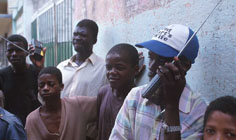23 July 2003
MediaNews 10 - July 2003
Angola - Media liberation in low gear
By Bram Posthumus
Censorship has a long history in Angola. It first appeared under the Portuguese colonial government and has continued unabated since independence was achieved in 1975. Now that the civil war has come to an end at last, the media enjoy a little more freedom of action. Itís high time NiZA went to Angola to look for suitable media partners. Renť Roemersma is parttime based in Angola for NiZA. He acts as a consultant for, among others, Radio Ecclesia, an Angolan independent radio station.
 | | Photo: Wilco van Herpen © |
media variety
Somewhat varied media can only be found in Luanda. According to the findings of the publicist, Paulo de Carvalho, the town boasts eight radio stations of which three are fully independent, one T.V. channel, one daily newspaper (the state-owned Jornal de Angola) and at least eight magazines, some of which appear regularly.
alternatives to the state-owned media
It is especially radio stations such as Luanda Antena Comercial and Radio Ecclesia that offer a clear alternative to the state-owned media. Among the foreign media Voice of America is the most popular, followed by BBC and the Portuguese World Service. The government is rather disinclined to liberate the airwaves.
control over peopleís opinion
Roemersma isnít surprised at all. 'There is no place that canít be reached by radio. Most people in towns can get FM channels, and in the rural areas youíve still got these old short-wave receivers.'
In Angola, whoever has control of radio transmissions has control over peopleís opinion.
Radio Ecclesia
This is the environment in which Radio Ecclesia operates. It used to cover the whole of Angola, but the pro-Portuguese station was confiscated and nationalised when Angola gained its independence in 1975.
A quarter of a century later Radio Ecclesia is back on the air as the only reliable domestic source of information by radio covering, however, Luanda only.
The station wants to play a role in the run up to the elections planned for 2004 or 2005.
In order to be able to realise its plans Radio Ecclesia wants to resume its national broadcasts. Part of the infrastructure has survived; what is still lacking is the programmes. The station is facing a number of obstacles, technical in nature by the look of it, yet political in nature on closer inspection.
retarding tactics
There are FM transmitting stations in six Angolan towns; these are inoperative, however. 'The Angolan government is a master at retarding tactics', says Roemersma. 'The government has decreed that every local station must apply for a broadcasting license with the local authorities. In some places this doesnít cause a lot of problems, but for instance in Huambo [the countryís second town, in central Angola Ė BP] the current governor is ab-so-lute-ly opposed to it.' Besides, technical proceedings are pending with the national institution that controls both telecommunication and radio frequencies. Radio Ecclesia went through all this already once, but was required to start it all over again.
The station is tired of waiting: in August it will commence its transmissions in a number of towns, whether or not a license will have materialised by that time.
cross-programme approach
It is intended that NiZA's Media Programme be interlinked with NiZAís two other main programmes: the Human Rights Programme and the Economic Programme. Roemersma is optimistic about this being possible: 'Most social organisations lack a proper media strategy. That is why we want to promote exchanges between journalists and activists.'
Publish What You Pay
Apart from the above NiZa is involved with campaigns such as Publish What You Pay. The latter campaign aims at urging the oil companies to make public how much they pay the Angolan government in order to secure contracts. These so-called signature bonuses are kept under wraps. Nobody knows how much money is tucked away in secret bank accounts held by the Angolan elite; estimates range between US $ 3 and 4 million.
The issue is an extremely touchy one with the MPLA, so the media have to tread very carefully and show great tact.
harassment of journalists
Independent journalists such as William Tonet (Folha 8), Rafael Marques and Mario Paiva are steadily being harassed by the police. The same goes for foreign correspondents. At least four journalists have been murdered over the last decade.
Earlier this year the Minister of Information, de Vaal Neto, accused Radio Ecclesia of 'antenna terrorism', after Ecclesia had put up an open microphone in a densely populated district of Luanda. Just imagine how outrageous, giving ordinary people an opportunity to vent their opinion on the state of affairs in their country!
plans
Roemersma reports on the latest plans: 'We are going to bring mobile Internet facilities to people all over the country in order to open up cyberspace to more people. We are also going to use the Internet for Radio Ecclesia to get in touch with the huge Angolan community outside Angola. And we have an elaborate plan to let children tell about their ideas of the future.' One question which is as simple as it is fundamental is at the centre of all of this: what kind of Angola do you want to live in? Links
Radio Ecclessia - www.radioecclessia.org
Publish What You Pay - www.publishwhatyoupay.org
Radio Ecclesia is partner of NiZA's Mediaprogramme (broadcastingunit). partner profile
Bram Posthumus is a freelance journalist working in and about West and Southern Africa.
|

